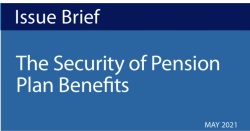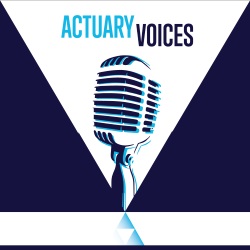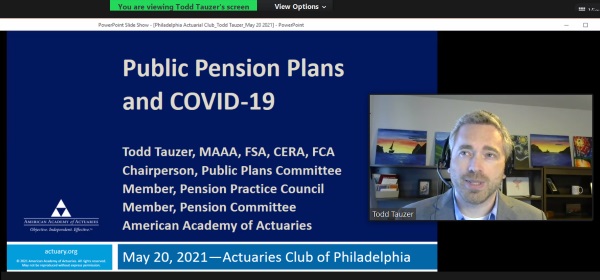The Retirement Report, Spring 2021
Vol 4 | No. 2
Pension Practice Council Conducts Virtual ‘Hill Visits’

Geddes
KeenerPension Practice Council (PPC) volunteers and Academy staff virtually visited with congressional offices and federal agencies May 10–11, discussing a number of key pension topics pertaining to Social Security, multiemployer pension plans, lifetime income, and retirement security generally.
Almost 20 Academy volunteers took part in about two dozen meetings with U.S. House and Senate offices and committee staff members, and with representatives from federal agencies including the Treasury Department, Labor Department, the Congressional Budget Office, and the Government Accountability Office.
“The Hill visits provided an excellent opportunity for the PPC to highlight recently published and upcoming Academy publications and to discuss a number of recent legislative and regulatory developments,” said Tim Geddes, the Academy’s vice president, pension.
Social Security Committee Chairperson Amy Kemp said it was “a great experience to meet with congressional staff and discuss possible Social Security reforms. It was interesting to hear more about the reform provisions being proposed, and about the congressional process. The Social Security Committee looks forward to providing its continued nonpartisan, objective, and independent analysis of such efforts to Social Security public policymaker stakeholders.”
“The nonpartisan work the Academy does is really valued on the Hill, especially by members and staffers who are working on the retirement risk and financial security public policy issues actuaries have specialization in,” said Retirement System Assessment and Policy Committee Chairperson Eric Keener. “It’s a great reminder that the PPC and its committees can provide meaningful input on provisions that to improve retirement policy and outcomes in the U.S.”
PPC Releases Issue Brief on Benefit Guarantees
 The Pension Practice Council (PPC) released an issue brief, The Security of Pension Plan Benefits, that discusses factors relevant to the security of typical employer-sponsored defined benefit pension plans in the United States.
The Pension Practice Council (PPC) released an issue brief, The Security of Pension Plan Benefits, that discusses factors relevant to the security of typical employer-sponsored defined benefit pension plans in the United States.
Key points include:
- The security of a pension plan’s benefits can depend on factors such as the plan design, funded level, asset allocation, plan sponsor, and other specific characteristics.
- There are many factors that stakeholders may wish to consider specific to the circumstances of a plan in evaluating the security of a plan’s benefits.
- Policymakers considering legislative proposals that would affect retirement plans may benefit from reviewing the benefit security mechanisms now in place.
Issue Brief Released on Pooled Employer Plans
The PPC’S Retirement System Assessment and Policy Committee released an issue brief, Pooled Employer Plans—Employer Considerations. Pooled Employer Plans (PEPs) are a significant development that could reduce costs, complexity, fiduciary liability/risks, and administrative burdens for employers seeking to offer 401(k) retirement plans, and could simplify the process for smaller employers that do not currently offer such plans.
This year could see significant developments in private-sector retirement plans. The Setting Every Community Up for Retirement Enhancement (SECURE) Act, enacted in December 2019, enables new types of retirement plans that may make it easier for smaller employers to offer such plans in the future.
Among the provisions of the SECURE Act was the establishment of PEPs, effective Jan. 1, 2021. PEPs allow multiple, unrelated employers of any size to participate in a single retirement plan that is a defined contribution plan qualified under Internal Revenue Code section 401(a).
Currently, nearly half of U.S. workers do not have access to participate in an employer-sponsored retirement plan, with the majority employed by smaller employers who often do not sponsor plans for a variety of reasons, including the cost to maintain a plan, potential legal liability, and the compliance and administrative efforts required.
The issue brief notes that there are many important issues employers consider in determining whether to offer a PEP to their employees and in selecting a pooled plan provider. Analyzing these issues may be complex and challenging, especially for small employers, and not all of these issues are equally important to every employer, it states.
Social Security Webinar Looks at Reform Options

KempThe Academy hosted a March 16 webinar, “Social Security Reform Options Through the Lens of Individual Equity and Social Adequacy Considerations,” in which three presenters from the Social Security Committee discussed potential reform issues in conjunction with the released of two publications—a monograph, Individual Equity and Social Adequacy in the U.S. Social Security System, and an issue brief, Individual Equity and Social Adequacy: A Principle-Based Study of Social Security Reform Proposals.
Presenters were Social Security Committee Chairperson Amy Kemp and Past Chairpersons Janet Barr and Ron Gebhardtsbauer. Senior Pension Fellow Linda K. Stone moderated.
“Individual equity and social adequacy are both essential to the success of Social Security,” Kemp said. “Balance between the two has changed as the system has evolved.” Slides and audio are available free to logged-in Academy members. Proposals discussed during the webinar included those made in recent years to address the program’s projected looming trust fund shortfall and more recently other options not designed to achieve trust fund balance put forward by President Biden.
‘Actuary Voices’ Features Senior Pension Fellow Linda K. Stone
 A recent “Actuary Voices” podcast features a conversation with Academy Senior Pension Fellow Linda K. Stone.
A recent “Actuary Voices” podcast features a conversation with Academy Senior Pension Fellow Linda K. Stone.
Conducted in March during Women’s History Month, Stone reflected on pension issues as they impact women and shared her family’s experience with her mother working as a “Rosie the Riveter” during WWII.
Women typically live longer than men and often earn less in their working careers, so the need for a long and secure retirement is magnified, she said. The challenges are even greater for minority women, who earn less than men and who often have less access to retirement plans or homeownership.
Stone cited proposed legislative reforms as noted in the Academy’s recent Social Security webinar to boost women’s retirement security, and pointed to her testimony several years ago before a congressional committee about retirement issues facing women. The bipartisan nature of that hearing “was very encouraging” about reaching a bipartisan consensus around retirement issues.
“One of the highlights of this year, I hope, is going to be some bipartisan retirement legislation,” she said. “The good thing is between the House and the Senate, there are proposals that will make a difference for the 50% of people who are not in retirement plans.”
Academy Service and Volunteerism Awards Deadline Is June 25
A reminder that the deadline is June 25 to submit nominations for the Academy’s 2021 distinguished service and volunteerism awards. Service is the heart of the Academy and its mission, and these awards recognize the substantive and noteworthy work being accomplished by actuaries in their volunteer work for the Academy.
Nominate a fellow Academy member who has made a difference for the public and the U.S. actuarial profession to receive one of the Academy’s prestigious awards:
- The Robert J. Myers Public Service Award honors an actuary who made an exceptional contribution to the common good, specifically through a single noteworthy public service achievement or a career devoted to public service. Submit a nomination here.
- The Jarvis Farley Service Award is an award presented to an actuary whose volunteer efforts on behalf of the Academy have made significant contributions to the advancement of the profession throughout their volunteer service. Submit a nomination here.
In addition to these two singular awards, the Academy also recognizes volunteers who have gone above and beyond in the last year and made a difference to our work through their volunteer work:
- The Outstanding Volunteerism Awards honor Academy volunteers who have made noteworthy contributions during this past year. The Academy recognizes the exceptional efforts of volunteers across all practice areas for their work in public policy and professionalism. Submit a nomination here.
The awards will be presented in conjunction with the Academy’s 2021 Annual Meeting and Public Policy Forum this fall. More information about this year’s annual event will be released soon.
Webinar Covers Risk-Sharing Plan Designs
The Pension Practice Council (PPC) held an April 27 webinar, “Risk-Sharing Plan Designs—Going Deeper (Part 1),” the first of a two-part series exploring this topic in depth.
Members from several PPC committees presented and had an in-depth discussion of new pension plan designs to minimize cost volatility and/or provide gain sharing. Presenters were Lee Gold, of the Retirement System Assessment and Policy Committee; Mariah Becker, a member of the Multiemployer Plans Committee; and Tom Vicente, from the Public Plans Committee. Pension Committee member Rachel Barnes moderated.
Gold covered “pure” variable benefit plans and benefit stabilization, Becker discussed multiemployer plans, and Vicente covered public plan considerations and offered examples of current state risk-sharing benefits. In discussing possible enabling legislation and policy issues, Gold said that “one thing that would be helpful is to have some specific approval from the IRS about floors and ceilings. … It would be nice to have some specifics around these points, and smoothing of investment returns.”
“There’s a real interest” in risk-sharing plans, Becker said, and gave several examples of multiemployer variable plans, and adoption and transition issues. She also noted bipartisan interest in the GROW Act—Give Retirement Options to Workers Act—which would provide for new risk-sharing plan design to be made available to multiemployer plans.
Panelists took questions from participants during the webinar for a lively exchange. Slides and audio are available free of charge to logged-in Academy members.
Multiemployer Plans Webinar Looks at Key Issues
The April 6 pension webinar, “Multiemployer Pension Plan Provisions of the COVID-19 Stimulus Law: Overview and Implementation Considerations,” examined provisions of the recently enacted American Rescue Plan Act of 2021 (ARPA), which provides relief to some underfunded multiemployer plans.
Presenters were Multiemployer Plans Committee Chairperson Christian Benjaminson, Vice Chairperson Joe Hicks, and committee member and past Academy Pension Vice President Josh Shapiro. Senior Pension Fellow Linda K. Stone moderated.
Presenters reviewed some of the key challenges that have faced multiemployer plans stemming from the 2008 financial crisis and looked at ARPA in context with other legislative efforts and proposals put forth in recent years.
They covered issues related to the role of the Pension Benefit Guaranty Corporation (PBGC) and made observations that while the new law addresses challenges for some troubled plans, it does not comprehensively reform the multiemployer system. Slides and audio are available for logged-in Academy members.
Save the Date: August Webinar to Focus on Multiemployer Plan Regulatory Implementation
The Multiemployer Plans Committee is planning an August pension webinar, “Multiemployer Plan Provisions in the American Rescue Plan Act of 2021 (ARPA)—Discussion of Recently Issued Regulations.” Following up on its April 6 webinar that reviewed the recently enacted ARPA multiemployer plan relief provisions, this webinar will discuss anticipated PBGC regulations and their implications for plan sponsors. The webinar is scheduled for Aug. 3, with registration slated to open in early July.
 On May 20, PPC member and Public Plans Committee Chairperson Todd Tauzer presented a pension track session at the Actuaries Club of Philadelphia’s Virtual Spring Meeting. The session addressed the potential implications of the COVID-19 pandemic for pension plans, with a focus on public pension plans as outlined in the Academy issue brief, The Impact of the COVID-19 Pandemic on Public Pension Plans, released in December. Tauzer also discussed recent PPC work, including recent pension issue briefs and other Academy resources.
On May 20, PPC member and Public Plans Committee Chairperson Todd Tauzer presented a pension track session at the Actuaries Club of Philadelphia’s Virtual Spring Meeting. The session addressed the potential implications of the COVID-19 pandemic for pension plans, with a focus on public pension plans as outlined in the Academy issue brief, The Impact of the COVID-19 Pandemic on Public Pension Plans, released in December. Tauzer also discussed recent PPC work, including recent pension issue briefs and other Academy resources.

